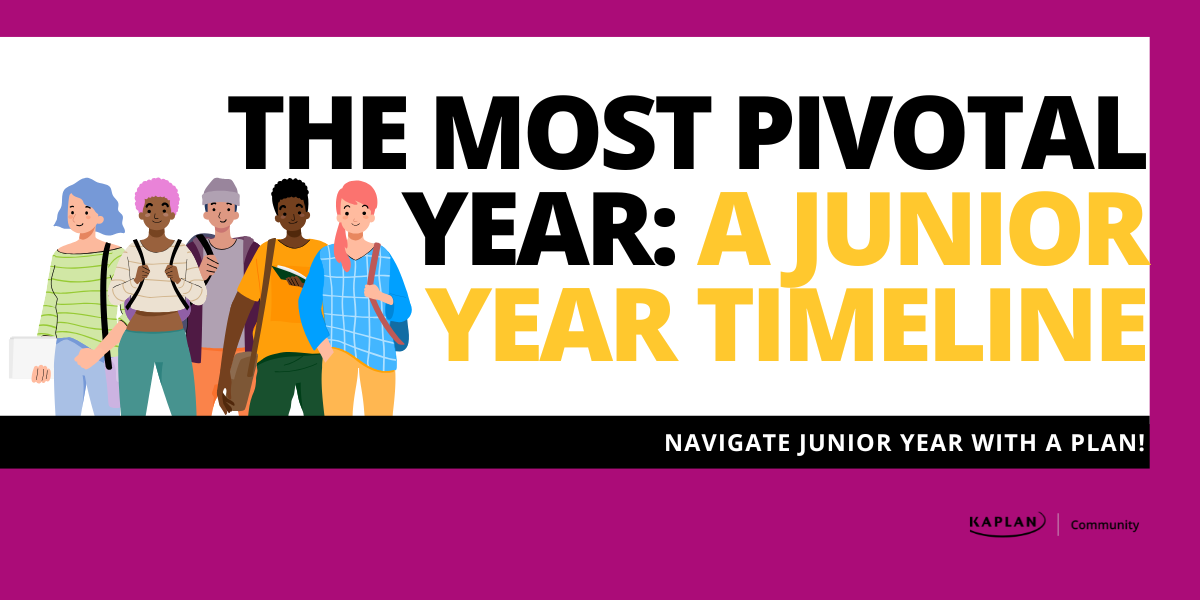High School Junior Year: The Most Pivotal Year - A Timeline for Success!
Sara_AdmissionsConsultant
Posts: 6 

Junior year is often considered the most pivotal year in high school because it's how colleges get the clearest, most complete picture of your academic ability before you apply. It plays a key role in admissions decisions, scholarships, and setting yourself up for a strong senior year. But don't worry, staying on track is totally achievable with a little planning!
Here's a breakdown to help navigate this important year:
Fall (September - November): Laying the Groundwork
- Focus on Academics: This is so important! Colleges will be looking closely at both your junior year grades and the rigor of your courses, so do your best and challenge yourself academically. Admissions officers want to see that you’re pushing yourself and ready for college-level work.
- Meet with your School Counselor: Discuss your academic progress, college aspirations, graduation requirements, and potential standardized tests.
- Build Strong Relationships with Teachers: Most colleges require letters of recommendation from your junior or senior year teachers, and since you’ll only spend a few months with senior year teachers before early deadlines hit, junior year is your best opportunity to form meaningful connections. Be intentional: participate in class, attend office hours, and show your curiosity. A thoughtful letter from a teacher who knows you well can make a big difference in your application.
- Explore College Options (Early!): Start thinking about what you want in a college. Size? Location? Programs?
- Trusted Resource: BigFuture by College Board - https://bigfuture.collegeboard.org/
- Get Ready for the PSAT/NMSQT: You’ll take the official PSAT in October of junior year, and this is the one that matters for National Merit recognition and other College Board honors. High scores can lead to scholarships and impressive distinctions that look great in your Common App Honors section, so take it seriously and consider doing some light prep beforehand.
- Standardized Testing Prep. Junior year is ideal for testing so make sure you are focusing on test prep.
- Extracurriculars & Leadership: Continue to engage in activities you're passionate about. Colleges value depth and commitment over a long list of fleeting involvements. Look for leadership opportunities!
Winter (December - February): Research & Refine
- Continue Strong Academics: Don't let those grades slip after the holidays!
- Standardized Test Prep (Intensify): Decide whether you'll focus on the SAT or ACT (or both). Take practice tests to identify areas for improvement. Aim to take your first official test in the spring.
- Deep Dive into College Research: Start creating a preliminary list of colleges. Look at admission requirements, programs of study, and campus life.
- Consider Campus Visits (Virtual or In-Person): If possible, attend college fairs or virtual tours.
- Start Your Common App Account: If you haven’t already, create a Common App account. You can start it as early as you want, and everything will roll over into your senior year. Begin filling out the main Common App tab (the part that gets sent to all colleges), including sections on testing, academic honors, and activities. This gives you a clear picture of what colleges will ask for and how they’ll evaluate you. Aim to complete most of this section by the end of junior year. You’ll thank yourself later!
- Start Brainstorming Your College Essay: Winter is a great time to begin brainstorming your personal statement for the Common App. You’ll still have the summer to work on it, but while you have access to your English teacher, counselor, or trusted mentors, ask for early feedback on your ideas or a rough draft. Aim to finish your personal statement by August 1, when the Common App refreshes and college-specific essay prompts go live. Then, you can shift your focus to those!
Spring (March - May): Action & Application Prep
- Take Standardized Tests (SAT/ACT): Aim to take your first official SAT or ACT. This gives you time to re-take if needed.
- AP Exams/IB Exams (if applicable): Prepare for and take any AP or IB exams to potentially earn college credit.
- Continue College Research & Refine List: Narrow down your list to a manageable number of "reach," "target," and "safety" schools.
- Secure Your Teacher Recommendation Letters: Don’t wait until senior year! Ask your teachers for recommendation letters before the school year ends. Choose teachers who know you well and can speak to your growth or strengths, and let them know why you’re asking them and what you appreciated about their class. Provide a short brag sheet tailored to them to help them write a strong, personalized letter.
- Plan Ahead for Your Counselor Recommendation: Many counselors require students to complete a brag sheet or detailed questionnaire to help them write your letter of recommendation. Some may even request input from your parents. Find out what your school’s process is now, so you’re not scrambling in the fall. If you can, get a head start on the brag sheet this spring. it’ll give your counselor more to work with and make your fall much less stressful.
- Summer Plans: Plan for a productive summer. This could include a job, internship, volunteer work, summer college program, or test prep. Colleges appreciate how you use your summers.
Junior year is a marathon, not a sprint. Stay organized, communicate with your parents and school counselor, and celebrate your progress along the way! You've got this!
7
